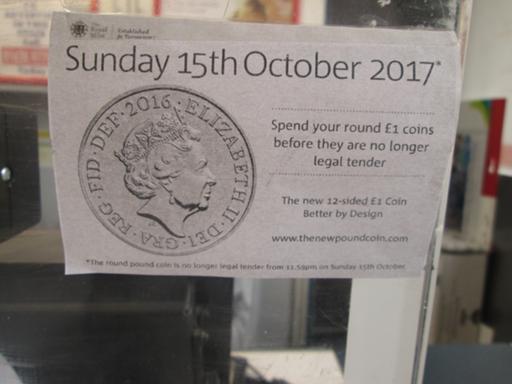Even I (not the person most exposed to news media) heard Dire Warnings
recently about original pound coins ceasing to be legal tender on 15
October.
The clear implication, and sometimes the overt statement, was
"spend them now", and here's an example from my local post office.

But these are two separate statements that have no particular
relationship to each other.
(Disclaimer: I'm not a lawyer, I'm just one of the very few people who
thinks you should be able to know what the law is, and works for an
organisation that makes it freely available to you. Further
disclaimer: my employer has nothing to do with this post.)
Legal tender is a precise legal concept which has only a tangential
relationship to whether a coin is spendable. It's not even for
settlement of debts between individuals, though that's a common
simplification of the situation. If I owe you money, you sue me for
it, and I offer the court that amount in legal tender, the court
is obliged to accept it in settlement of my debt, rather than (e.g.)
taking whatever it was that secured the debt. If it's not legal
tender, it's up to the court whether they choose to accept it. And if
it doesn't involve a court but is a transaction directly between us,
then it's simply a matter for mutual agreement. (In practice if you
refuse to accept legal tender in settlement of a debt and choose to
sue instead the court is unlikely to look kindly on you.)
This mostly protects the debtor (who knows that a particular thing
must be accepted). There are also limits on amounts of coinage: if I
offer the court a sack of 2p pieces, they don't have to haul them away
and count them, they can simply say "that's not legal tender, we don't
accept it, go away and come back with something sensible". (Pound
coins and larger are legal tender for any amount, though, so you can
still get fairly silly if the sum is large.)
But for example Sterling notes issued by Scottish banks are not legal
tender, not only in England but in Scotland: they are universally
accepted, but in a legal sense that's by agreement between the parties
rather than as a requirement of law. (Similarly with Northern
Ireland.)
Here's a place where legal tender blatantly doesn't apply, though:
shopping. If I pick up a thing in a shop and take it to the till,
there's no debt involved: the shop (by putting a price label on
something) has issued an invitation to treat. I say, in legal effect,
"I will give you these shiny metal discs in return for that thing",
the shopkeeper agrees, and the contract of sale is made. There's never
a debt, so legal tender is not relevant. But the shopkeeper can choose
to decline my offer.
This is why vending machines don't need to accept all notes and coins;
and why shops can refuse large bills, or even refuse to take cash at
all, or (as in the case of Tesco in the UK) refuse to accept old-style
pound coins some weeks before they ceased to be legal tender. (It's
also why a price in an advertisement isn't binding.)
So to get back to the sign in the post office, what matters is whether
the post office or other shops will still accept old pound coins,
which is not being stated – though in practice they now won't. The
coins can still be changed at banks, so they're not losing their
value; it's just more inconvenient to realise it. (And quite a few
vending machines still don't accept new pound coins, and probably
won't be updated for months.)
Of course, getting people to spend more makes the economy look better,
briefly. There have been over 2,000,000,000 old pound coins circulated
overall, and there were 300,000,000 new ones in the initial minting,
so even a small chunk of that being suddenly spent might make a
noticeable blip.
Comments on this post are now closed. If you have particular grounds for adding a late comment, comment on a more recent post quoting the URL of this one.